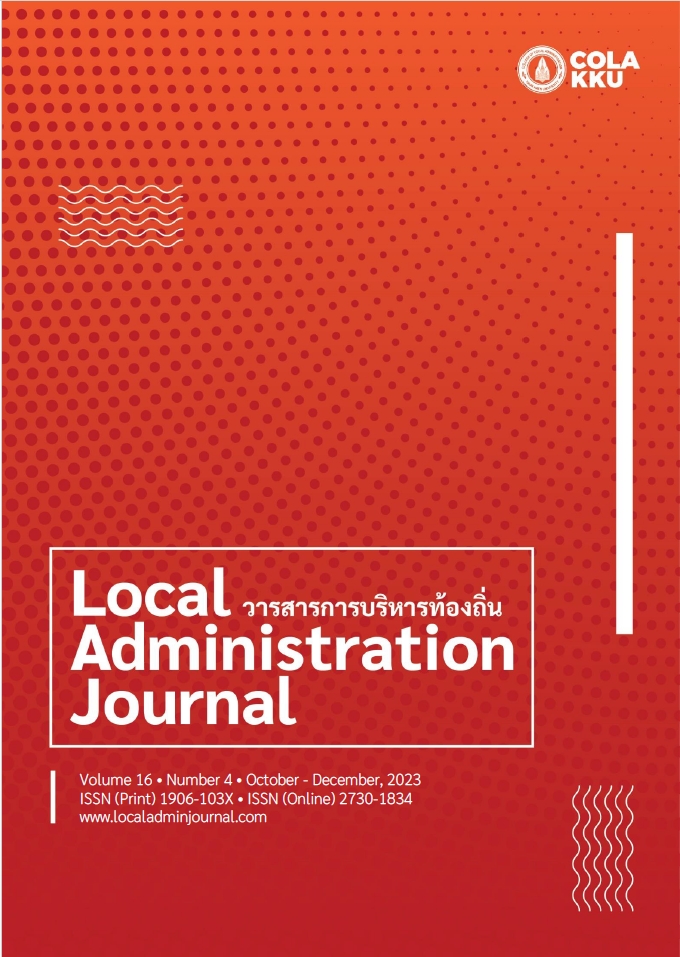การเปรียบเทียบประสิทธิภาพการจำแนกข้อมูลเพื่อทำนายการตัดสินใจเลือกตั้งในอนาคตของนักธุรกิจไทย โดยใช้เทคนิควิธีการทำเหมืองข้อมูล
คำสำคัญ:
ตัวแบบวิธีต้นไม้ตัดสินใจ, วิธีแบบเบย์, วิธีการถดถอยโลจิสติกส์, วิธีแรนดอมฟอร์เรสบทคัดย่อ
การวิจัยครั้งนี้มีวัตถุประสงค์เพื่อเปรียบเทียบประสิทธิภาพโมเดลการจำแนกข้อมูลเพื่อทำนายการตัดสินใจเลือกตั้งในอนาคตของนักธุรกิจไทย โดยใช้ข้อมูลจากการตัดสินใจเลือกตั้งในอนาคตของนักธุรกิจ
ทั้ง 7 ภูมิภาคทั่วประเทศไทย มีข้อมูลจำนวน 6 แอตทริบิวต์ และจัดเก็บจำนวน 2,917 ชุด การวิเคราะห์ข้อมูลใช้โปรแกรม Rapid Miner 10.1 ในการวิเคราะห์ปัจจัยที่เกี่ยวข้องและทดสอบประสิทธิภาพด้วยวิธี 10-Fold Cross Validation กับตัวแบบวิธีต้นไม้ตัดสินใจ (Decision Tree) วิธี Bayes วิธีการถดถอยโลจิสติกส์ (Logistic Regression) และวิธีแรนดอมฟอร์เรส (Random Forest) ผลการวิจัย พบว่า การจำแนกประเภทที่มีค่าความถูกต้องสูงสุดโดยวิธีแรนดอมฟอร์เรส มีค่าร้อยละ 88.85 รองลงมาคือ วิธีต้นไม้ตัดสินใจ มีค่าความถูกต้อง ร้อยละ 88.51 วิธี Bayesมีค่าความถูกต้องร้อยละ 88.46 และวิธีที่ถูกต้องน้อยที่สุด คือ วิธีการถดถอยโลจิสติกส์ มีค่าความถูกต้องร้อยละ 88.11ตามลำดับ งานวิจัยนี้สามารถนำไปใช้ทำนายเพื่อวิเคราะห์แนวทางในการหาเสียงเลือกตั้งของพรรคการเมือง และพัฒนาระบบสารสนเทศเพื่อใช้ประกอบการพิจารณาในการกำหนดนโยบายเพื่อการพัฒนาประเทศต่อไป
เอกสารอ้างอิง
De Clercq, D., Haq, I. U., Azeem, M. U., & Ahmad, H. N. (2019). The relationship between workplace incivility and helping behavior: roles of job dissatisfaction and political skill. The Journal of psychology, 153(5), 507-527.
Good, M.C. & Schwepker, C. H. (2022). Business-to-business salespeople and political skill: Relationship building, deviance, and performance. Journal of Business Research, 139(2022), 32-43.
Han, J., Pei, J. & Tong, (2022). Data mining concepts and techniques (4th ed.). Morgan Kaufman Publishers. Retrieved from https://gsmis.snru.ac.th/e-thesis/file_att1/ 2023031063426423118_fulltext.pdf (in Thai)
Jaroenpuntaruk, W. (2015). Date Warehouse, Data Mining and Business Intelligence. Nonthaburi: Sukhothai Thammathirat Open University. (in Thai).
limmane, A. (2015). State society and change: A consideration on power, policy, and relationship network (2nd ed). Bangkok: Siamparitas. (in Thai)
Plangsree, S. (2022). Factors affecting people’s decision to vote for the council member and administrators of Nakhon Phanom local government organzations (master’s thesis). Sakon Nakhon Rajabhat University, Sakon Nakhon, Thailand.
Riera, P., & Cantú, F. (2022). Electoral systems and ideological voting. European Political Science Review, 14(4), 463-481.
Sinsomboonthong, S. (2015). Data Mining (1st ed). Bangkok: Chamchuri Product. (in Thai)
Teeravakin, L. (2009, May 13). Role of business persons of political. Retrieved from https://mgronline.com/daily/detail/9520000053345
Witten, I. H., Frank, E. & Hall, M. A. (2011). Data mining: Practical machine learning tools and techniques (3rd ed.). Burlington, Massachusetts: Morgan Kaufmann Publishers.
ดาวน์โหลด
เผยแพร่แล้ว
รูปแบบการอ้างอิง
ฉบับ
ประเภทบทความ
สัญญาอนุญาต
ลิขสิทธิ์ (c) 2023 วารสารการบริหารท้องถิ่น

อนุญาตภายใต้เงื่อนไข Creative Commons Attribution-NonCommercial-NoDerivatives 4.0 International License.
บทความทุกเรื่องที่ได้รับการตีพิมพ์ทั้งรูปเล่มและบทความออนไลน์ เป็นลิขสิทธิ์ของวิทยาลัยการปกครองท้องถิ่น มหาวิทยาลัยขอนแก่น



